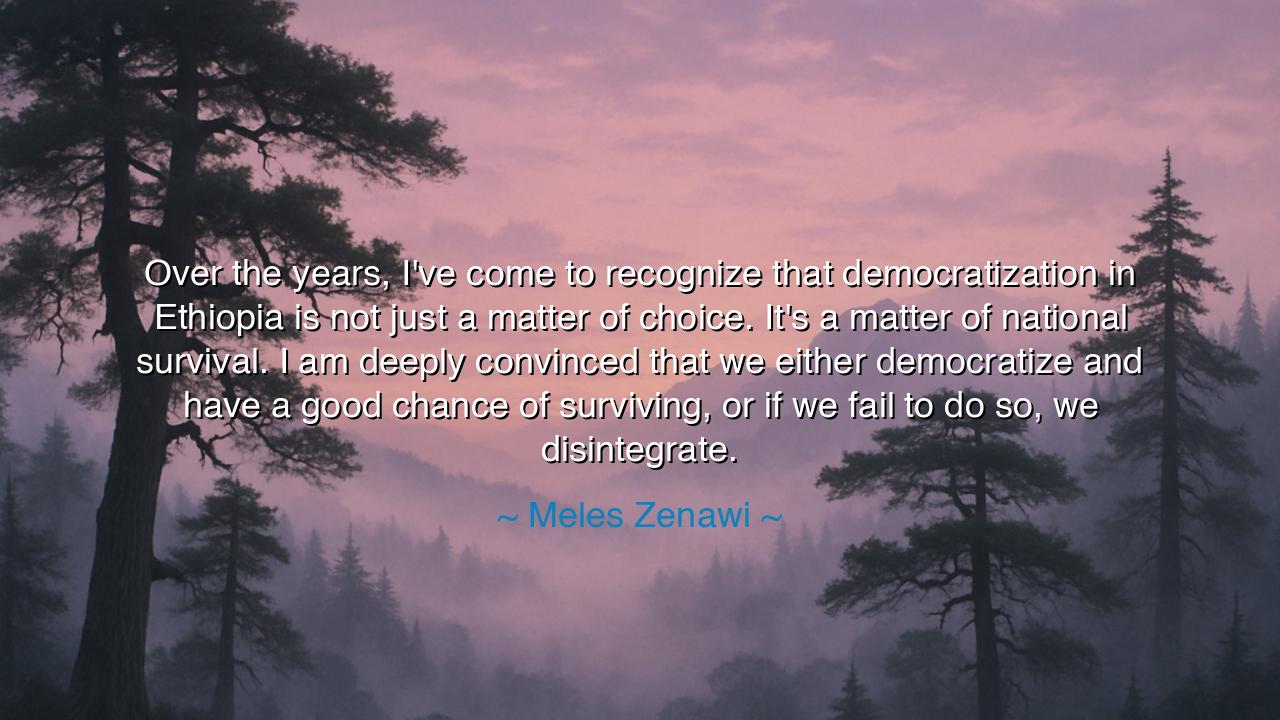
Over the years, I've come to recognize that democratization in
Over the years, I've come to recognize that democratization in Ethiopia is not just a matter of choice. It's a matter of national survival. I am deeply convinced that we either democratize and have a good chance of surviving, or if we fail to do so, we disintegrate.






In the ancient dance of nations, where empires rise and fall, there lies a truth that has been passed down through the ages—the survival of a people is not ensured by the strength of their armies, the wealth of their rulers, or the glory of their past. Meles Zenawi, a leader deeply invested in the fate of his nation, speaks to this truth when he says, “Over the years, I’ve come to recognize that democratization in Ethiopia is not just a matter of choice. It’s a matter of national survival. I am deeply convinced that we either democratize and have a good chance of surviving, or if we fail to do so, we disintegrate.” His words are not just a call to action; they are a profound declaration of the relationship between freedom, justice, and the endurance of a nation.
The ancients knew that the strength of a nation was rooted not in its rulers alone, but in the will of the people. Consider the Greek city-states, where the Athenians birthed the idea of democracy—a system where power was not concentrated in the hands of a few but distributed among many. Pericles, the great statesman of Athens, spoke of democracy not merely as a political system, but as the soul of the city-state. In his famous funeral oration, he declared that the strength of Athens lay not in its walls or its armies, but in the collective spirit of its people, united in the pursuit of justice, equality, and freedom. Zenawi’s words echo this ancient wisdom—democracy is not a mere luxury, but a necessity for the survival of a nation.
Throughout history, the rise and fall of nations have been dictated by their ability to evolve and adapt. Rome, once the greatest empire the world had ever known, eventually crumbled under the weight of corruption, inequality, and authoritarianism. The fall of Rome serves as a powerful reminder that when a nation fails to embrace justice, inclusivity, and accountability, it sows the seeds of its own disintegration. Zenawi, in his deep understanding of history, recognizes that for Ethiopia to endure, it must embrace the principles of democratization, for only in a system where all voices are heard and justice prevails can a nation thrive. Democracy, for him, is not a choice but the very foundation upon which the future of his nation rests.
The challenges faced by Ethiopia, much like those of ancient civilizations, are profound. A nation torn by division, ethnic strife, and historical injustices must find a way to unite its people under a banner of equality and shared purpose. Just as Mahatma Gandhi led the Indian independence movement with the belief that true freedom could only be attained through nonviolent means, Zenawi understands that true democracy in Ethiopia will not come through force or oppression, but through the collective will of the people, who must be empowered to shape their future. The democratization of Ethiopia is not simply a political endeavor—it is a moral imperative for the survival of the Ethiopian people.
Consider the example of South Africa in the late 20th century, when the nation was gripped by the horrors of apartheid. Under the leadership of Nelson Mandela, South Africa undertook a long and difficult journey toward democracy—a journey that involved deep sacrifice, reconciliation, and the painful process of dismantling a system of racial oppression. Mandela’s wisdom was rooted in the understanding that a nation cannot survive unless it embraces democracy and justice for all of its people. Through forgiveness, dialogue, and the commitment to building a nation based on equality, South Africa emerged stronger. In a similar vein, Zenawi’s vision for Ethiopia’s survival lies in the nation’s ability to embrace a system that provides justice and freedom for all its people, regardless of their ethnicity, region, or history.
The lesson that Zenawi imparts to us is both simple and profound: the future of a nation is not secured by the power of its rulers or the might of its armies, but by the justice and freedom that it affords its people. Democracy is not a luxury; it is the very foundation upon which the nation’s survival depends. When the will of the people is disregarded, when freedom is suppressed, and when equality is denied, the nation begins to unravel. Zenawi calls upon us to recognize that democracy is not just a political choice, but a moral necessity, a pathway to ensuring the longevity of a people and their culture.
So, let this wisdom guide us in our own lives and our own nations: democracy is not a mere ideal to be debated, but a fundamental right and a pathway to survival. Whether in our communities, our governments, or our personal relationships, we must choose democracy, choose the values of freedom, justice, and equality. These values are the lifeblood of any society, and it is only by embracing them that we ensure a future worth living for. As Zenawi teaches us, without democracy, we risk not only the failure of our systems but the very survival of our nations. Let us strive, then, to build societies where the will of the people is honored, and where every individual has the opportunity to contribute to the common good. For in doing so, we not only secure our survival but build a world worthy of the future we hope to create.






AAdministratorAdministrator
Welcome, honored guests. Please leave a comment, we will respond soon